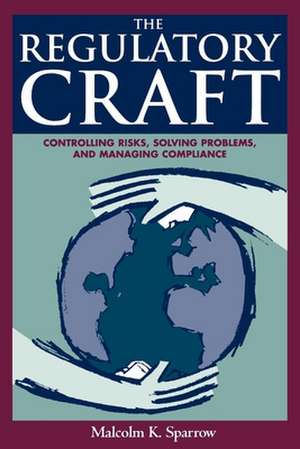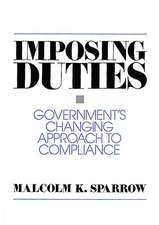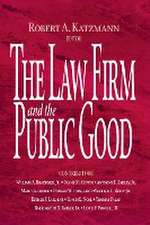The Regulatory Craft: Controlling Risks, Solving Problems, and Managing Compliance
Autor Malcolm K. Sparrowen Limba Engleză Paperback – mai 2000
The Regulatory Craft tackles one of the most pressing public policy issues of our time—the reform of regulatory and enforcement practice. Malcolm K. Sparrow shows how the vogue prescriptions for reform (centered on concepts of customer service and process improvement) fail to take account of the distinctive character of regulatory responsibilities—which involve the delivery of obligations rather than just services.In order to construct more balanced prescriptions for reform, Sparrow invites us to reconsider the central purpose of social regulation—the abatement or control of risks to society. He recounts the experiences of pioneering agencies that have confronted the risk-control challenge directly, developing operational capacities for specifying risk-concentrations, problem areas, or patterns of noncompliance, and then designing interventions tailored to each problem. At the heart of a new regulatory craftsmanship, according to Sparrow, lies the central notion, "pick important problems and fix them." This beguilingly simple idea turns out to present enormously complex implementation challenges and carries with it profound consequences for the way regulators organize their work, manage their discretion, and report their performance. Although the book is primarily aimed at regulatory and law-enforcement practitioners, it will also be invaluable for legislators, overseers, and others who care about the nature and quality of regulatory practice, and who want to know what kind of performance to demand from regulators and how it might be delivered. It stresses the enormous benefit to society that might accrue from development of the risk-control art as a core professional skill for regulators.
Preț: 157.48 lei
Nou
Puncte Express: 236
Preț estimativ în valută:
30.13€ • 32.22$ • 25.12£
30.13€ • 32.22$ • 25.12£
Carte disponibilă
Livrare economică 27 martie-10 aprilie
Livrare express 12-18 martie pentru 32.41 lei
Preluare comenzi: 021 569.72.76
Specificații
ISBN-13: 9780815780656
ISBN-10: 0815780656
Pagini: 370
Ilustrații: black & white illustrations
Dimensiuni: 152 x 229 x 21 mm
Greutate: 0.54 kg
Ediția:New.
Editura: Brookings Institution Press
Colecția Brookings Institution Press
Locul publicării:United States
ISBN-10: 0815780656
Pagini: 370
Ilustrații: black & white illustrations
Dimensiuni: 152 x 229 x 21 mm
Greutate: 0.54 kg
Ediția:New.
Editura: Brookings Institution Press
Colecția Brookings Institution Press
Locul publicării:United States
Notă biografică
Malcolm K. Sparrow is Professor of the Practice of Public Management at the John F. Kennedy School of Government, Harvard University. He is Faculty Chair of the School's Executive Programs on regulation and enforcement, corruption control, policing, and counter-terrorism.
Descriere
A Brookings Institution Press and the Council for Excellence in Government publication
The Regulatory Craft tackles one of the most pressing public policy issues of our time—the reform of regulatory and enforcement practice. Malcolm K. Sparrow shows how the vogue prescriptions for reform (centered on concepts of customer service and process improvement) fail to take account of the distinctive character of regulatory responsibilities—which involve the delivery of obligations rather than just services.In order to construct more balanced prescriptions for reform, Sparrow invites us to reconsider the central purpose of social regulation—the abatement or control of risks to society. He recounts the experiences of pioneering agencies that have confronted the risk-control challenge directly, developing operational capacities for specifying risk-concentrations, problem areas, or patterns of noncompliance, and then designing interventions tailored to each problem. At the heart of a new regulatory craftsmanship, according to Sparrow, lies the central notion, "pick important problems and fix them." This beguilingly simple idea turns out to present enormously complex implementation challenges and carries with it profound consequences for the way regulators organize their work, manage their discretion, and report their performance. Although the book is primarily aimed at regulatory and law-enforcement practitioners, it will also be invaluable for legislators, overseers, and others who care about the nature and quality of regulatory practice, and who want to know what kind of performance to demand from regulators and how it might be delivered. It stresses the enormous benefit to society that might accrue from development of the risk-control art as a core professional skill for regulators.
The Regulatory Craft tackles one of the most pressing public policy issues of our time—the reform of regulatory and enforcement practice. Malcolm K. Sparrow shows how the vogue prescriptions for reform (centered on concepts of customer service and process improvement) fail to take account of the distinctive character of regulatory responsibilities—which involve the delivery of obligations rather than just services.In order to construct more balanced prescriptions for reform, Sparrow invites us to reconsider the central purpose of social regulation—the abatement or control of risks to society. He recounts the experiences of pioneering agencies that have confronted the risk-control challenge directly, developing operational capacities for specifying risk-concentrations, problem areas, or patterns of noncompliance, and then designing interventions tailored to each problem. At the heart of a new regulatory craftsmanship, according to Sparrow, lies the central notion, "pick important problems and fix them." This beguilingly simple idea turns out to present enormously complex implementation challenges and carries with it profound consequences for the way regulators organize their work, manage their discretion, and report their performance. Although the book is primarily aimed at regulatory and law-enforcement practitioners, it will also be invaluable for legislators, overseers, and others who care about the nature and quality of regulatory practice, and who want to know what kind of performance to demand from regulators and how it might be delivered. It stresses the enormous benefit to society that might accrue from development of the risk-control art as a core professional skill for regulators.













